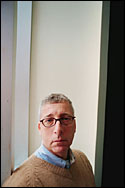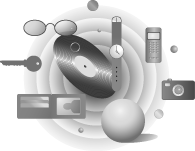Kaleidoscope
Pierre-Paul Tellier: Is there a doctor at the rave?
 PHOTO: Claudio Calligaris
PHOTO: Claudio Calligaris |
|
It's 25 degrees Celsius in Pierre-Paul Tellier's Brown Building office, oppressively warm on a nippy winter's day, yet the doctor can't cool the room for his visitor.
"Sorry," he smiles, benignly. "I've been in this office for two years and I still haven't figured out how to adjust the thermostat yet. It's either freezing or too hot in here."
If Tellier seems resigned towards his lack of climate control, blame it on his incredibly busy schedule. He's got more pressing concerns.
To begin with, Tellier is director of undergraduate studies at McGill's Department of Family Medicine, where he teaches, develops curricula and supervises several interns. Then he's an attending physician at the Jewish General Hospital.
The bulk of his time, however, is spent as medical director of McGill's Student Health Services, headquartered at the aforementioned Brown Bldg. Outside McGill, Tellier works two nights a week as a clinician at Head & Hands, a non-profit organization that caters to young people in Montreal's west end.
There's more. He's currently an honorary board member for AIDS Community Care Montreal and a volunteer physician for the BBCM Foundation, the mega-party organization built by McGill alumnus Robert Vézina, which has raised nearly $1 million for Montreal's queer-related organizations.
Over the last three years, Tellier has assembled a 40-person, volunteer medical team to care for attendees of BBCM raves; nightlong events that attract up to 17,000 partygoers. "We see everything from people who take drugs for the first time and pass out on the floor to people who need an Aspirin," he says.
Given Tellier's devotion to front-line medicine, it's surprising to discover he originally wanted to be a biologist. After completing a BSc at the University of Ottawa, a classmate dared Tellier to enrol at the same institution to earn his MD.
He did. But Tellier wasn't immediately enthralled with medicine. "The problem was that I'd always been impressed by the wonderful and caring doctors portrayed on TV," he recalls. "In real hospitals people are not like that."
His residency at the Montreal Children's Hospital, where an attending physician provided inspiration, changed Tellier's negative impressions. "That doctor took time to speak to his patients," says Tellier, remembering the incredible look of gratitude on the face of one teen patient after an explanation about the significance of contracting an STD. "That was an amazing experience for me. I thought, I want to be that kind of doctor, where patients look at me with that same look in their eyes."
The experience convinced Tellier that youth medicine was his calling. And judging by Tellier's office wall, which is filled with thank-you cards from his young patients, it appears his mission to serve this clientele effectively has been accomplished.
"Whenever I feel depressed," he says, "I just look up at that wall and feel much better."
Mostly, though, Tellier concentrates on making others feel better. But he admits that much of what he treats at McGill's Student Health Services is simple runny noses and sore throats. Make that many runny noses, since the clinic received 20,000 visitors last year.
"Seventy percent of our clientele are young, out-of-province students who are living away from home for the first time," Tellier says. "Many of these students don't know how to deal with simple things such as a cold, since their parents would have cared for that in the past."
First-year students, Tellier says, typically experience anxiety when living away from home for the first time. "This means they are free to party for the first time, too," he says.
That's why, Tellier says, "professionals at Student Health Services try to teach students how to be adults."
McGill's Student Health workers educate their clientele about topics ranging from using drugs and alcohol in moderation, to what protections exist against sexually transmitted diseases.
From the onset of his career, Tellier has developed an expertise in STDs. He is also an expert on queer health and gives lectures on both topics to residents at the Jewish and St. Mary's hospitals every year.
Tellier says he particularly enjoys working with young people. "It can be challenging because students are idealistic and often see things in black or white," he says. "But it's always fun.
"Part of what makes my work interesting is that I know that I'm working with an age group where I can have an impact," he says. "I know I can help students establish a healthy lifestyle that they can keep for a large part of their lives."
 |
||||
|
A cageful of drunken monkeys is like a cocktail party. You have one who gets aggressive, one who gets sexy, one who thinks everything's funny and one who gets really grumpy. |
||||
Land of the lost
 ILLUSTRATION: Tzigane
ILLUSTRATION: Tzigane |
|
They may be no help if you've lost your marbles, but Security Services' Lost and Found sees all McGill's flotsam and jetsam. Louise Savard, acting manager for Security Services, says, "You name it, we got it."
Bikes, helmets, walkmen, wallets, calculators, cellphones, pagers, jewellery, knapsacks, key chains, pencil cases -- these are some of the usual items. Then there are the slightly offbeat things: shoes, rosaries, glucose meter, vinyl album by Loverboy (Wild Side), dissection kit (for study purposes, we're hoping). Currently they've got a huge concrete ball -- some pillar's going topless out there.
Don't just assume someone walked off with your CD player or cashmere gloves. It's worth getting in touch with Security Services, easily done by filling out a report on their web site.
What happens to the left behind?
If an item isn't deemed valuable (sweaters, scarves, mittens) it stays in the building's porter's office for a week, then security picks it up. Valuables go to security right away, and passports go to police station 19. Items in the Lost and Found are held onto for two months, then donated to a charitable organization -- Sun Youth this year. Any pens, pencils, or crayons go to McGill's daycare.
Items that can be misused in the wrong hands are destroyed if they aren't claimed by their rightful owners -- pocket knives, credit cards and, yes, dissection kits.
When a wallet comes in, administrative secretary Kathy Sheehan goes a-sleuthing and traces it to the original owner. Students generally pick up their ID cards now that it costs $20 to replace them.
"It's amazing how much doesn't get claimed," Savard says. Sheehan remembers one woman was delighted to hear her silver rings were found, but she never picked them up. "It's like we have to beg people to take their stuff back."
 |
||||
|
The notion that this particular combination of egg and sperm is so sacred that we cannot use it for research is, I think, a form of embryo fetishism. |
||||
Dial-a-fraud
 ILLUSTRATION: Tzigane
ILLUSTRATION: Tzigane |
|
You know that old Ann Landers adage, "if it seems too good to be true, it probably is?" Well, that can apply to a great-sounding summer job, which just might be amoral and illegal to boot.
So says the Centre of Operations Linked to Telemarketing Fraud (COLT). They're keen to get the word out to students that Montreal is a major centre for telephone bilkdom.
An estimated 90 percent of fraudulent telemarketing companies operate in this town, and they're trawling for anglophone university students to make calls to Western Canada and the States.
There are legitimate companies out there. The ones with recognizable names who need articulate students to handle service calls, for example. But for every department store, there are a dozen of Acme Sales Incs. who want well-spoken, educated people to lend an air of credibility to their shady operations.
These dubious companies offer high pay and commissions -- up to $75 000 a year. Popular schemes include phoning people (often seniors) to say they've won a fabulous prize worth tens of thousands of dollars, but they have to pony up the tax before it's sent to them. Voila, a nice box of cheap pens is in the mail, nothing more.
Nicholas Calamatas of Career and Placement Services remembers one student who was busted when working for such a business. He evaded arrest by testifying against his employer, but had made such good money he decided to open up his own fraudulent company. Now he has a criminal record. "He ruined his life," says Calamatas.
COLT pamphlets detailing the legal requirements of a telemarketing call are available widely, showing students how to sniff out a less-than-honest company.
For more info, or help finding legitimate work, call CAPS at 398-3304.

